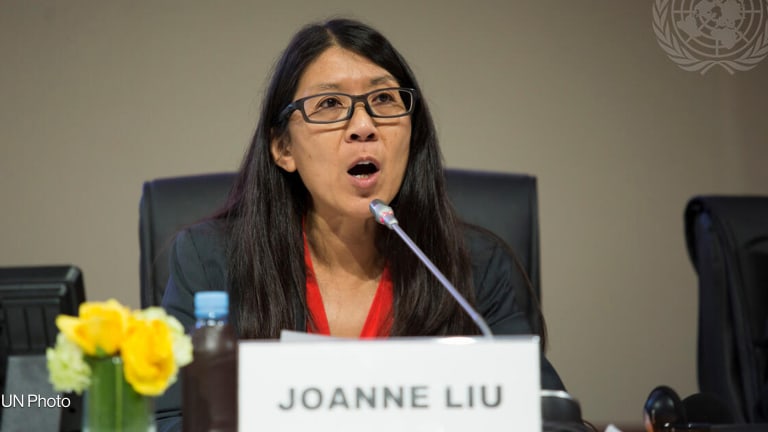
WASHINGTON — A virtual pledging conference for Venezuelan refugees and migrants raised $2.79 billion in total commitments Tuesday.
Representatives from UNHCR and the International Organization for Migration, which supported the conference along with the European Union and Spain, said the United Nations agencies were pleased with the results of the conference, which was livestreamed on YouTube. Of the $2.79 billion raised, $653 million is grant funding.
Virtual Venezuela pledging event moves ahead as COVID-19 pushes needs to $1.41B
The Regional Refugee and Migrant Response Plan for Venezuelans has long struggled to attract funding, but its needs were revised even higher before the pledging event.
“This conference has allowed the international community to finally focus on a humanitarian crisis that has been very much neglected over the past few years. The burden of hosting 5 million refugees and migrants was mostly on the countries in the region, and I hope that the countries in the region today heard a strong message of solidarity,” said U.N. High Commissioner for Refugees Filippo Grandi.
Before the conference, the Regional Refugee and Migrant Response Plan for Refugees and Migrants from Venezuela — which was recently revised to take into account new funding needs for COVID-19 and now totals $1.41 billion — was only 10% funded. Eighty percent of the Venezuelans who have fled their homes in the wake of their country’s economic and political collapse are hosted in Latin America and the Caribbean, with the largest amount — 1.8 million — currently in neighboring Colombia.
While some had connection or sound issues, the virtual conference program largely operated smoothly, with participation from countries such as Japan, the United Arab Emirates, Sweden, and Canada.
Delegates emphasized the stress that the coronavirus is putting on a humanitarian response already stretched thin.
Grandi said COVID-19 is pushing Venezuelan refugees and migrants into a “spiral of poverty and despair” because many who had previously worked as day laborers, domestic workers, or street vendors have been prevented from earning money by pandemic mobility restrictions. Those rules have also limited humanitarian access to vulnerable populations and forced NGOs to scale back services. Some Venezuelans have chosen to go back to their country because they cannot earn enough for basic food and shelter.
“This conference has allowed the international community to finally focus on a humanitarian crisis that has been very much neglected.”
— Filippo Grandi, high commissioner for refugees, U.N.Antonio Vitorino, IOM director general, said the amount of money raised Tuesday was “very impressive.”
“This pledging conference was not just about money. It was also about human suffering and the sense of urgency. All the participants share in the need to provide the necessary lifesaving instruments for the 5 million of Venezuelans displaced in the region,” Vitorino said. “This conference is also not just about the 5 million, but it was also about the very many millions of host communities who are called to share, on a daily basis, the suffering of the Venezuelans.”
The U.S. has been the largest donor to the Venezuela crisis to date, funneling millions of dollars through U.N. agencies for regional response activities as well as funds to specific countries where millions of Venezuelans have settled, such as Colombia, Brazil, and Ecuador. U.S. Secretary of State Mike Pompeo announced an additional $200 million in assistance on May 20 ahead of the pledging conference, bringing the total from the U.S. since fiscal year 2017 to more than $856 million.
Amy Tohill-Stull, deputy assistant administrator at the U.S. Agency for International Development, said at the conference that the agency will spend $76 million on humanitarian assistance needs such as shelter, education, protection, cash assistance, and water, sanitation, and hygiene. Development assistance aimed at meeting longer-term needs will account for $57.2 million of this amount.
The funds raised must be spent in consultation with NGOs as well as the target population, according to Monica Gomez, advocacy officer at Jesuit Refugee Services’ Latin America and Caribbean regional office.
“It is the great responsibility of the contributing and receiving countries to coordinate with civil society organizations a well-planned implementation and with participation and active tracking from Venezuelan migrants and refugees,” Gomez said, stressing that regional protection strategies should be prioritized.
Regional leaders such as Colombian President Ivan Duque — who has long made pleas for more international support as he chose to keep borders open to Venezuelans — said the pledged funds must reach the region swiftly since the needs with COVID-19 have grown exponentially.
Pledges announced Tuesday mean the 2020 Regional Refugee and Migrant Response Plan is now nearly 50% funded, an amount that Vitorino said he was happy with, considering that 2020 is not yet half over. More funds will need to be raised for the remainder, and Canada is set to hold the next pledging conference for Venezuelans.
“I’m optimistic that this year, from the humanitarian point of view, we will do much better than before,” Vitorino said.








